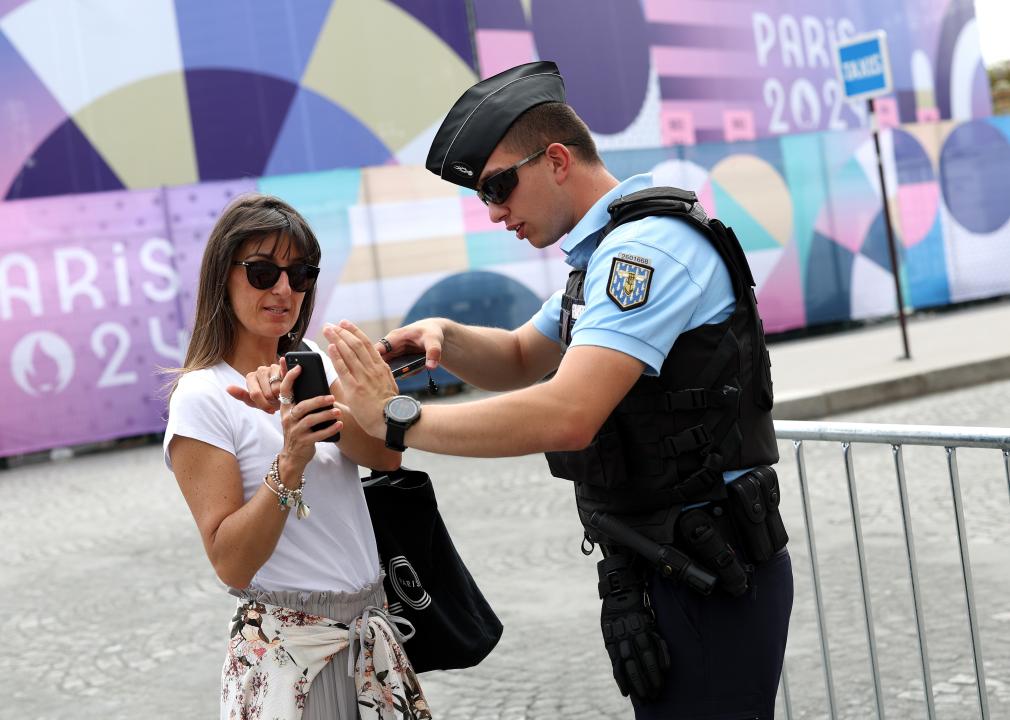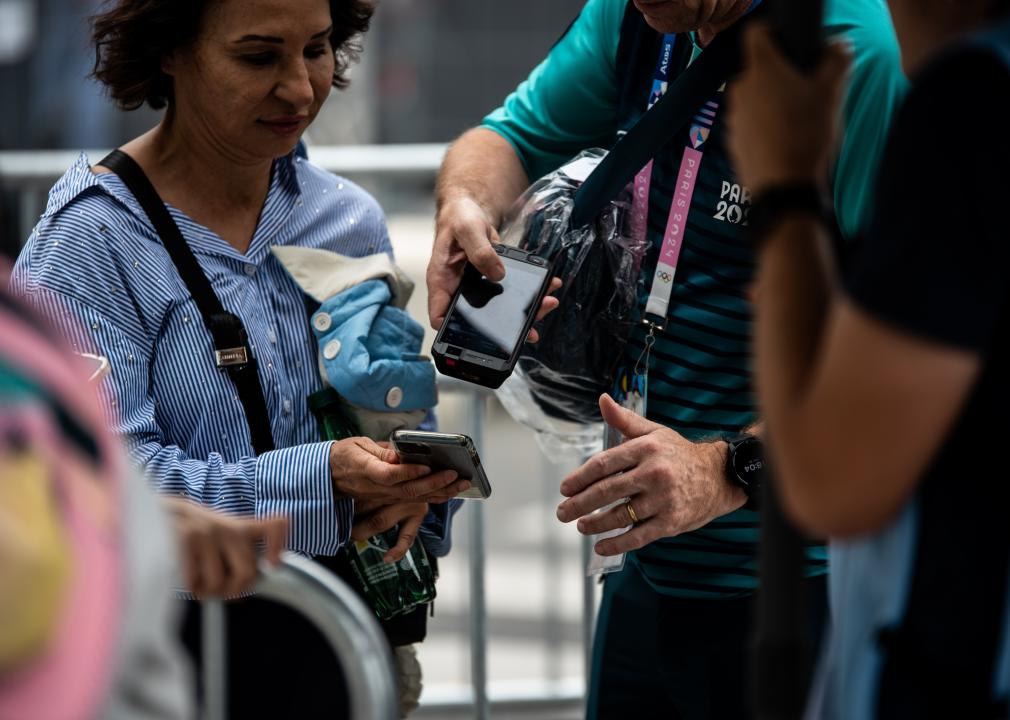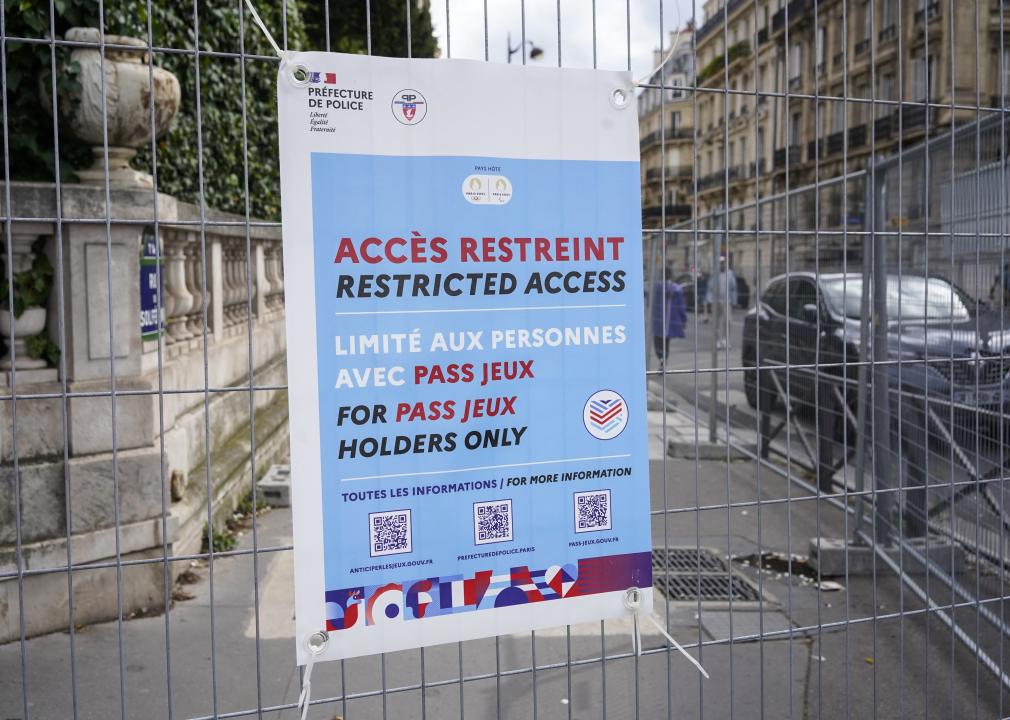QR codes and crowd control: How technology is changing the future of live events
Carl Recine // Getty Images
QR codes and crowd control: How technology is changing the future of live events
People show their QR access code to get into the Olympics.
If you happened to be in or around Paris for the 2024 Summer Olympics, then you got the opportunity to see the French capital transformed into a bustling metropolis filled with supreme athletes, world-class venues, and pop-up events.
Well, as long as you had your Games Pass.
Throughout the two weeks of competition, tourists, workers, and locals needed a QR code displayed on their phones (or printed out) to enter a variety of security zones set up around Olympic sites. The Games Pass, acquired by filling out online forms and submitting photo identification, made getting around town safe, smooth, and efficient. It was also another example of how venues have leaned into innovation and transformed the way patrons enter and enjoy games, concerts, and other live events.
The shift to digital ticketing and entry began before the coronavirus pandemic, as more people (particularly in Europe) began using credit cards and their phone’s digital wallets to purchase items at supermarkets and retail stores. When COVID-19 spread around the world, stadiums and event spaces (along with public transportation) began implementing this technology in earnest. They eliminated touchpoints between patrons and ushers and replaced them with barcode scans and RFID, helping to both reduce the spread of infection and make transactions quicker and easier.
Over the last few years, however, this initial health precaution has become the norm. No longer do you need physical tickets for the subway or a paper ticket to enter an arena. As the live event industry continues to rebound and grow, venues have committed to mobile and contactless entry, using ticket tech advancements to provide better customer experiences. In March, for example, OpenSea partnered with Coachella, a music and arts festival, to release NFT collections that offer VIP and merchandise opportunities. In 2023, New York City’s largest music festival, Governors Ball, went completely cashless, requiring patrons to buy and activate wristbands for admission.
As this touchless trend continues, Uniqode examined news reports, market research, and other sources to see how ticketing technology is changing the future of live events.
![]()
Andrea Savorani Ner // Getty Images
Pros and cons of digital ticketing
Ticket control at the opening ceremony of the Paris 2024 Olympics.
It used to be a common experience that if you went to a baseball game or concert with a group of friends, everyone needed to enter at the same time. How else would each member of your party receive their individual physical ticket and get admitted? Now, digital ticketing allows for the ability to transfer tickets electronically so that anyone in your party (especially those stuck in traffic) can enter the venue whenever they can or want, without the worry of a dropped or missing ticket.
The benefits of digital ticketing, however, extend far beyond time efficiency and a better social experience. Companies like Ticketmaster have recently provided secure ticket technology that helps eliminate fraud and counterfeiting by preventing screenshots of tickets from being scanned.
Meanwhile, other companies and venues are turning to mobile blockchain ticketing to target similar dangers, making sure that nobody is duped into purchasing fake tickets. The blockchain effectively labels each ticket with its own identity, which then requires further verification should a ticket holder want to sell or transfer their ticket after its purchase. The technology has also proven helpful in eliminating bots from gobbling up online tickets that resellers exploit with exorbitant prices on third-party sites.
Still, the digital switch has its share of kinks. According to Lloyds Bank, British music lovers reportedly lost more than 1 million British pounds in scams attached to Taylor Swift’s Eras tour. About 90% of this reported fraudulence started on social media, where scammers targeted unofficial Taylor Swift Facebook groups with enticing online ticket offers as demand surged. In addition to false individual offers, there is also a proliferation of fake ticket sites that bank on a ticket buyer not recognizing their illegitimacy during the emotional rush of finding a seat.
Once you’ve secured a real ticket, the mass conglomeration of fans in one area can wreak havoc on phone service, preventing you from loading your ticket’s barcode or QR code properly. With Ticketmaster disallowing screenshots to get scanned, finding a signal is crucial for entry and can cause plenty of delays as older and less tech-savvy customers approach the gates without their tickets ready to go.
LAURE BOYER // Getty Images
What the future of live events looks like
Police Prefecture sign on the gates in Paris with QR codes.
While the pandemic helped usher in the proliferation of digital ticketing, its widespread adoption throughout the transportation, sports, and entertainment industries only suggests further growth and tech advancement in the future.
The “smart ticketing market” in mass transit and air travel was valued at $10.8 billion in 2023, according to Fortune Business Insights. By 2032, projections put the market at $32 billion, thanks in large part to NFC, short-range wireless technology that makes tap-and-go payments possible.
When it comes to sports and entertainment, the event ticketing market is estimated to be worth $82.23 billion in 2024, according to Mordor Intelligence, and looks to reach $99.04 billion in the next five years.
Of course, plenty of newer technologies beginning to streamline ticketing and entry experiences will undoubtedly play a larger role in the coming years. Consider the use of AI-integrated facial recognition, a tech trend that’s being used in venues across the country, including Madison Square Garden in New York City, BMO Stadium in Los Angeles, and the Cleveland Browns Stadium.
The NFL is even rolling out face authentication for personnel, vendors, and media across all 32 stadiums. Implemented with various automated check-in apps, the tech makes entering sporting events, music festivals, and other private events quick and painless. Then there’s blockchain technology, which helps secure ticket distribution, and wearable tech (like smart bands), which uses RFID to drastically drop entry times.
As ticket buyers spend more income on major events, they prefer their experiences to be more personalized and less congested. Writing for an audience of stadium owners and operators, Deloitte outlines technological advances that feel seamless and personalized, from easy entry to events to VIP experiences—and ends with a cautionary reminder of just who all of this hoopla around technology is for.
“To successfully navigate the currents of change, teams and stadium owners should invest in a holistic approach to optimizing the stadium experience around the fans.”
Story editing by Carren Jao. Additional editing by Kelly Glass. Copy editing by Tim Bruns.
This story originally appeared on Uniqode and was produced and distributed in partnership with Stacker Studio.



